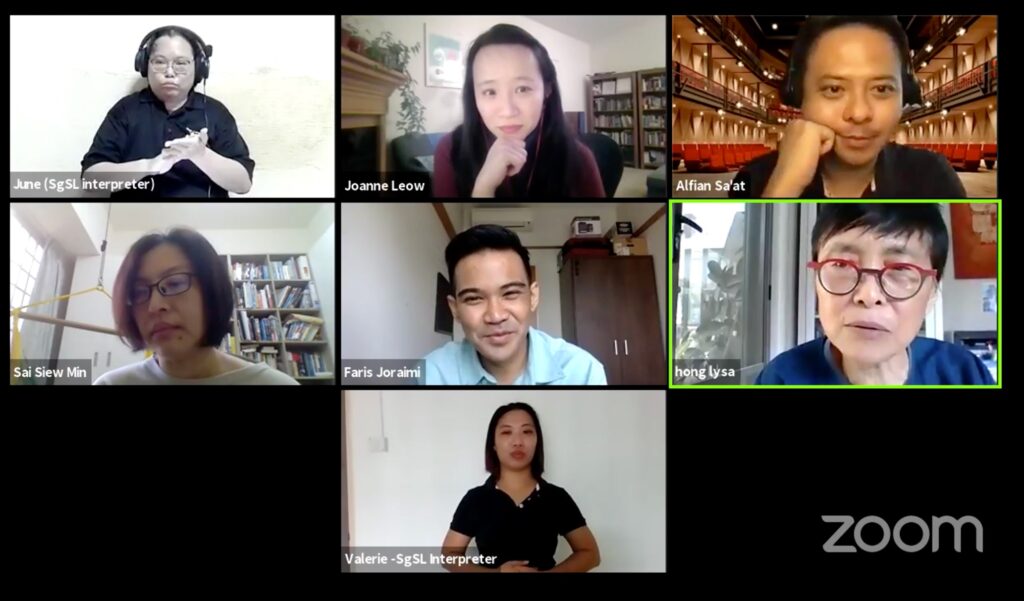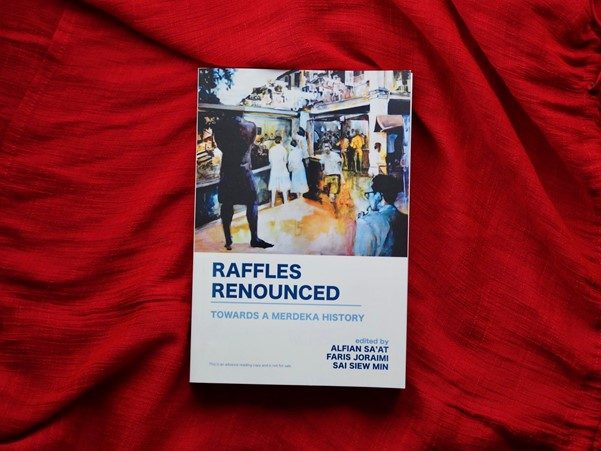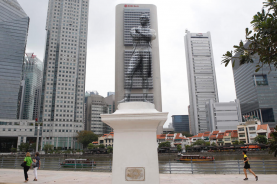In the first substantive chapter of Raffles Renounced, co-editor Alfian Sa’at asks his interlocutor and fellow theatre-maker Neo Hai Bin whether Singapore’s Bicentennial in 2019—the 200th anniversary of Singapore’s colonisation initiated by the arrival of Sir Stamford Raffles—would be remembered more for the critical discussion it generated rather than the commemorative affair its organisers intended. Indeed, as one of the book’s contributors (Nicholas Lua) points out, the Bicentennial was marked by a plurality of responses all over the city-state which “enabled [it] to grow larger than what the authorities originally mooted”.

The cover of Raffles Renounced, featuring City Dwellers (2014) by oil painter Hilmi Johandi. Photo by Ethos Books
Perhaps this plurality was aided by the unclear and inconsistent messaging imparted by the Bicentennial Office, but in general, it isn’t uncommon for Singaporeans to make full use of any opportunity afforded by the state to open up spaces for conversation. The Bicentennial was one such opportunity; even if its promises for different perspectives and nuanced takes on Singapore history was not fulfilled by the organisers, the promise was enough of an invitation for theatre groups, artists, academics and authors to fill the gaps themselves. I am delighted to report that the conversation is still ongoing, more than a year later, not only in the form of Raffles Renounced but also in the substantial events accompanying the launch of this monograph by Ethos Books.
I can count on one hand the books I know that deal specifically with Singaporean historiography (and not merely its history). Two contributors to Raffles Renounced, Hong Lysa and Huang Jianli, co-wrote one landmark publication in this field, The Scripting of a National History: Singapore and its Pasts (2008). That book was formative of my understanding of the construction of historical knowledge. I would also consider Sonny Liew’s graphic novel The Art of Charlie Chan Hock Chye as primarily a treatise on how history is told and re-told in Singapore. What these works—and now Raffles Renounced—have in common is their understanding of historying as performance and performative, not in the sense that it is “fake”, “pretend” or even merely “theatrical”, but in how it is framed for an audience: embodied, affective, and often ritual-like. In this sense, as Joanne Leow’s astute analysis of Merdeka/獨立 /சுதந்திரம் in Raffles Renounced reminds us, it is important to reveal how the performance of history “has already ‘been done’ and is continuing ‘to do’”.

Merdeka/獨立 /சுதந்திரம் (2019), staged by WILD RICE, and also the play that prompted many of the contributions in Raffles Renounced. Image credit: WILD RICE (supplied)
Despite its form as a written monograph with research essays, primary sources and footnotes aplenty, Raffles Renounced is far from what contributor Azhar Ibrahim might describe as the “cold academia” of colonial historiography. Like the play that first prompted the creation of this volume, its chapters are at times surprisingly moving, funny, and unafraid to be transparent about the messiness that a “Merdeka history” might engender. What’s clear is that this new historical mode cannot be merely expansionist, an approach that the Bicentennial took (‘let’s incorporate a wide range of narratives’), which seems inspired by the very colonial figures it aimed to nuance. It must instead overhaul the very frameworks with which we understand our history. This could be, for instance, going beyond the confines of present-day national boundaries and situating Singapore’s past as inextricable from that of the Malay World, as Azhar Ibrahim suggests. It could also take the form of rejecting the teleology of Singapore as an inevitable product of capitalist logics according to contemporary neoliberal and globalist agendas, as Faris Joraimi points out in his chapter. Why must Singapore’s past always be understood in the binary terms of “upswings” and “downswings”, “golden ages” and “eclipses”, “fishing villages” and “thriving port-city”? Sai Siew Min’s chapter also hinted at a critique of paternalism in Singaporean history-telling, and I wanted more: a Merdeka history that is unabashedly feminist.

“What is a Merdeka history”, a seminar organised by Ethos Books to accompany the book’s launch. Visit Ethos Books’ Facebook page for recordings of their events as well as information on future events. Image supplied.
On the unstable historical foundations of Singapore's (supposed) two-hundredth birthday.
Private: The Singapore Bicentennial: it was never going to work
Ultimately, though, the book’s title is decidedly in the past tense: Raffles, renounced. As we move towards a Merdeka history, disclaiming Raffles as a figure paramount to our past is a necessary first step, but one that still has Raffles as its centre. Perhaps now that the deed is done, we can proceed to the next chapter. Having read this book, I await this next stage with anticipation, and a newfound sense of optimism.
 Facebook
Facebook  Twitter
Twitter  Soundcloud
Soundcloud  Youtube
Youtube  Rss
Rss 
